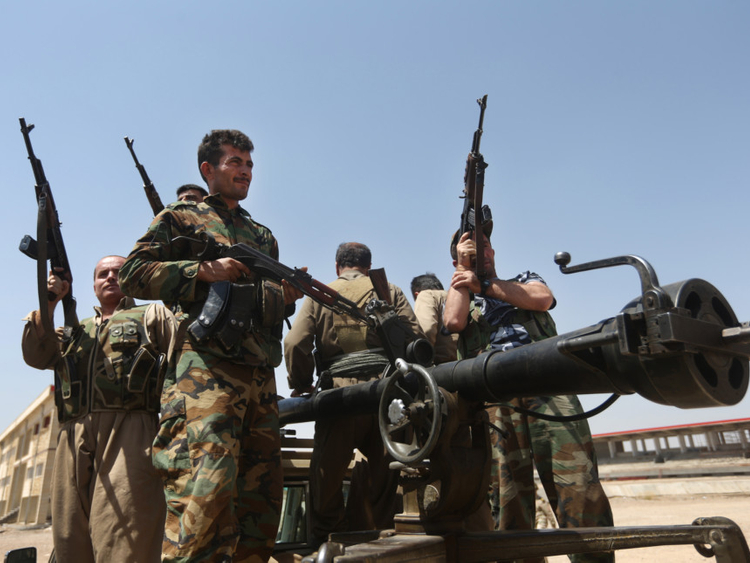The United Nations Assistance Mission for Iraq (UNAMI) has announced that 35,408 people were victims of violence in the country during 2014. The number included 12,282 dead and 23,126 injured, with 4,583 kidnapped. The fate of most of them is still unknown. The number of displaced people reached two million, the majority from Nineveh province. The year 2014 was the worst in Iraq since 2006. Last year, Daesh (the Islamic State of Iraq and the Levant) took control of many cities and vast expanses of Iraqi territory.
Not all these victims fell defending their homeland against foreign invasion. Moreover, most of them did not get killed carrying weapons; instead, they were victims of a mad sectarian civil war, controlled by third parties with vested interests. This is a war in which the distorted culture of the past has played a huge role in the destruction of the present.
Numbers, whether big or small, are devoid of emotions. They also do not appeal to romantics, simply because numbers do not touch the conscience as words do. However, behind these large numbers of victims stand huge human tragedies — the lives of people related to these victims and other social disasters, embodied in the increasing numbers of widows and orphans.
Our screams of sorrow and tears of grief are mixed with a terrifying, alien reality. However, we are compelled to approach the minute details with caution and great fear. The lives of Iraqis have been engulfed by unending brutality.
Since the past few years, we have ceased trying to imagine the future. Such is our misery. Trying to look at the future evokes the horrific scenarios we seek to overcome in order to have a better tomorrow, to escape the pain of the past and its wounds.
However, we have found ourselves forced to face this ugly reality that refuses to leave our land; it has now become a part of it. We are forced to engage in an awful dialogue, which we try to conduct in a non-violent manner. We do so for the sole reason of not becoming witnesses to more bodies torn apart, with body parts flying around and fountains of blood colouring the scenes of our day-to-day existence.
The current violence in Iraq is not the result of today’s actions alone. Nor is it the will of a handful of militia leaders alone. A situation such as this cannot prevail unless there is a strong culture of violence in the community that has deep roots that have strengthened as a result of pain, sadness, frustration and hatred in people over many years.
Even if we put aside the legacy of past conflicts — such as the Umayyad-Shiite, the Abbasid — Shiite, and the Ottoman-Safavid conflicts witnessed in what is present-day Iraq — and all that these conflicts have left behind in terms of violence and blood, we see that the country is still divided. And it is divided as per that same sectarian equation, which extended to the era following the July 14, 1958 revolution. We find ourselves facing continuous violence, with successive governments having monopolised the practice.
Iraqi governments did not allow this violence to extend beyond their control, except in cases where the governments were too weak and unable to control the scene.
During the last four decades, Iraq was involved in a series of irrational wars, starting with the long war with Iran and the war for the liberation of Kuwait. This was followed by the siege and the economic embargo, which lasted 13 years. Then came the American invasion and occupation.
A new generation was born during these decades that listened to and witnessed military communiques on a daily basis through the media. There was no easy way to shut yourself from the scenes of death and destruction in Iraq. Black banners decorated roof tops everywhere, mourning dear sons who were used as cannon fodder in senseless wars. Scores of poems and stories about the Iran-Iraq war heroes filled the ears of the youth, all of which contributed to creating war writers. For Iraqi intellectuals living in exile, this caused a lot of anxiety about the future of Iraq’s culture.
However, the change that took place in Iraq since 2003 placed all the contradictions of Iraqi society — that had been concealed under various guises — on the table, with various parties that had scores to settle. All this was possible only in the era of weak governments that also used violence in putting down demonstrations and protests.
Violence in Iraq is inseparable from the paralysis that has infected the national consciousness. Most political elites in Iraq today have nothing to do with national values, concepts and beliefs. They have come up based on race, creed, sect or region.
It is not easy to eliminate violence in Iraq without a strong government that imposes peace and security. For this to be achieved, a strong-willed government must be in place to put an end to outside interference and work for constitutional reforms. Such a government can end injustice and eliminate corruption if there are extraordinary efforts made by those who have a vision to dismantle the culture of violence in the country.
Mohammad Akef Jamal is an Iraqi writer based in Dubai.
Scourge of violence has deep roots in Iraq
The people’s screams of sorrow and tears of grief down the tumultuous years are mixed with a terrifying reality













